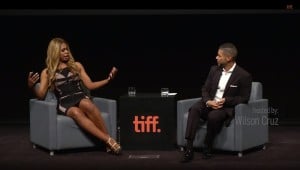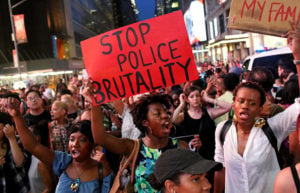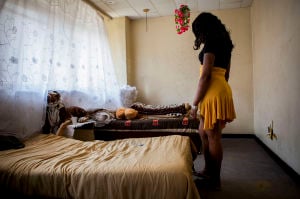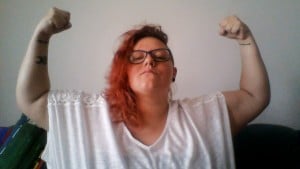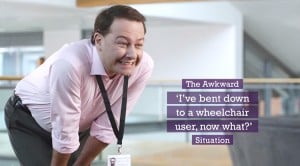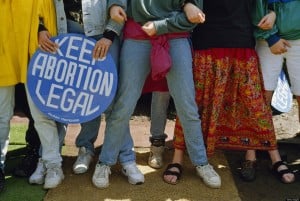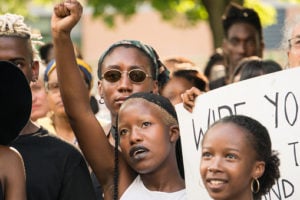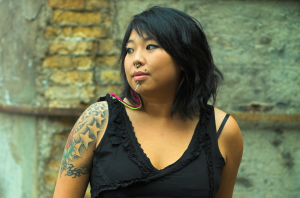
A person wearing earbuds looks at their laptop with a serious expression.
Originally published on The Establishment and republished here with their permission.
(Content Warning: death)
So much of my life happens on the web.
My groceries come through a meal service. I purchase and listen to music digitally. I pay my rent via an iPhone app. And a considerable amount of my work both in Black Lives Matter and beyond happens online.
In fact, many have discussed how the Internet and social media have helped shape and fuel this current movement for Black lives.
Digital sharing has allowed the plight of Black Americans to be seen widely, and we have used the web as a way to mobilize thousands around a single cause or case. Arguably, the Ferguson Rebellion and the movement for Black lives that followed it would not have been possible without the rapid information-sharing and network-building of social media.
But what has been championed as one of our greatest tools in this Black liberation movement has also become a world of utter terror that we cannot escape: Outside of our real life interactions, we are confronted with graphic images of the torture and murder of Black people almost constantly.
When there are Black deaths in this age of BLM, there is almost no way to escape the living nightmares. Video reels of Black murders autoplay on Twitter and Facebook feeds, filled with the images and everyone’s commentary around them. News stations and online publications spend days and even weeks poring through all the images and writing up all of the grief.
And because this information is being shared more widely, conversations around Black death might creep up where you least need them – at work and at school, with your barista and in line at the grocery store.
For those, like myself, who have been overwhelmed with reminders of the dire conditions for Black people in America, there is little shelter from the storm. And this sort of collective digital feeding upon the stories of Black people as perpetual dehumanized victims can also be a serious mental health trigger for some Black people.
Far past being simply a useful tool for facilitating political education and mobilizing a movement, the digital age has brought our nightmares into the daylight. Being Black in America feels eerily like the movie Friday the 13th.
It’s a sort of terror we can never wake up from, and our Internet sharing has been a part of this ongoing collective grieving.
But beyond its usefulness as a tool for awareness and education, and stemming from its tragic state as a deep and abiding ocean of Black trauma, our online engagement has come to fuel something very real and powerful for Black people.
The Internet has become a place where we can find digital safe havens to process and heal from this trauma with people who share our politics and values in a way that was never before possible.
It’s not a given that Black people have what they need or who they need to survive both mentally and physically the conditions we find ourselves in. Contrary to popular belief, Black people are not a monolith, and Black people can harbor and champion anti-Blackness themselves.
Many Black people like myself have had their entire worldviews changed by what they’ve learned about Black life, as we have seen riots, marches, murders, and repression in the past few years.
But just because you’re coming to a new awakening doesn’t mean the people around you are as well. When I became radicalized online via Twitter, my family and my friends were far behind and genuinely confused by my newfound passion.
When I finally entered BLM work, many of the people closest to me were not prepared to support me mentally, emotionally, and spiritually in the ways that I needed.
Instead, I, like countless others, formed relationships online with other Black people. We formed communities and friendships around the content we were sharing.
And for the first time for many of us, we had a community to run to when we needed to process the tragedy around us.
In part, the Black crisis we found ourselves in accelerated our bonds; and often skipping past small talk, we could provide one another with support, comfort, and education in as little as one Twitter thread or Facebook status.
And these conversations don’t just remain within the confines of our keyboards – they often come out into the real world. Beyond simply turning to people online during the darkest times, the strong bonds have made in-person connection feel appropriate and normal, helping us to survive the traumatic environment we have come to call home.
I’ve met people I knew online in coffee shops, at conferences, for dinner, and when visiting in their town. Next month, I’ll be going on vacation with some dear friends I’ve only known online. Some of my closest friends these days – the people I turn to when things get really rough – are people I met online. These bonds are deep and we are expanding our friendships beyond the screens.
There are a few reasons why these relationships make sense and become an important part of healing for Black people during this moment. For one, friendships online already have a certain degree of boundaries inherent in them. There is no pressure to meet up all the time, you don’t see people enough to get sick of them, and the interactions you do have end up being deeper because you only reach out when you really need to.
But more importantly, Black people get to connect over shared values and experiences, rather than having relationships simply dictated by location. More important than having someone to talk to in my neighborhood is having someone to talk to with whom I don’t feel like I need to explain myself, where I can support and be supported in a way that fits with my values.
When I met up with a Twitter friend a couple months ago, we laughed about how weird it was to meet friends you have only known on the web. Rather quickly, I replied, “Well, at least I know I don’t have to worry about you saying ‘All Lives Matter’ or ‘good cops,’ so I feel pretty safe.”
While you may not have had in-person interactions with someone you met on the web, you can learn a lot online about whether or not they might be a good support. You can literally search what they had to say when Mike Brown died, or if they have ever sex-shamed Beyoncé, or if they share feel-good cop videos, or if they’ve said anti-trans things about Serena Williams.
Ironically, online oversharing means you can weed people out based on politics and values faster than you can in the real world. Very rarely will you get all of this information in small talk in a party or at work, but you can find out information it would normally take months to learn through a few quick searches in their online presence.
We Black people cannot survive these times or this trauma in isolation.
But beneath the playground of our nightmares, the Internet can be a place for us to connect with each other in ways that are meaningful and healing.
We can expand our social circles and support networks beyond the limitations of our physical locations and in-person networks. We can form lasting relationships with people where we feel safe(r) politically and emotionally than our local contexts might allow.
And these relationships we form over that which is so meaningful to us – surviving and healing from white supremacy – run deep and come to life out in the real world.
We travel with these friends, eat dinner with these friends, talk with them on the phone, and visit them when we are in this city. We’re finding our healing and our freedom in the small places we can, and in the tradition of those in the African diaspora, we are creating beauty out of chaos and feasts out of crumbs.
More than ever, we need each other, and beneath the Facebook rants and the Twitter beefs we are finding our tribe, our chosen families. One post and one engagement at a time, our desire to connect manifested online is bringing us hope.
We may be living our nightmares, but online and in the world, we aren’t living it alone.
***
To learn more about this topic, check out:
- We Have To Create A Culture That Won’t Vote For Trump
- Depression-Busting Exercise Tips For People Too Depressed To Exercise
- How The Tobacco Industry Exploits LGBTQ People
[do_widget id=’text-101′]
Marissa is a speaker, writer, and consultant, specializing in political agitation in Black liberation movements. Drawing from her recent contributions in the Black Lives Matter movement, Marissa currently works with high school and college students organizing within their learning institutions and is currently working on a book documenting her radicalization.
Search our 3000+ articles!
Read our articles about:
Our online racial justice training
Used by hundreds of universities, non-profits, and businesses.
Click to learn more






